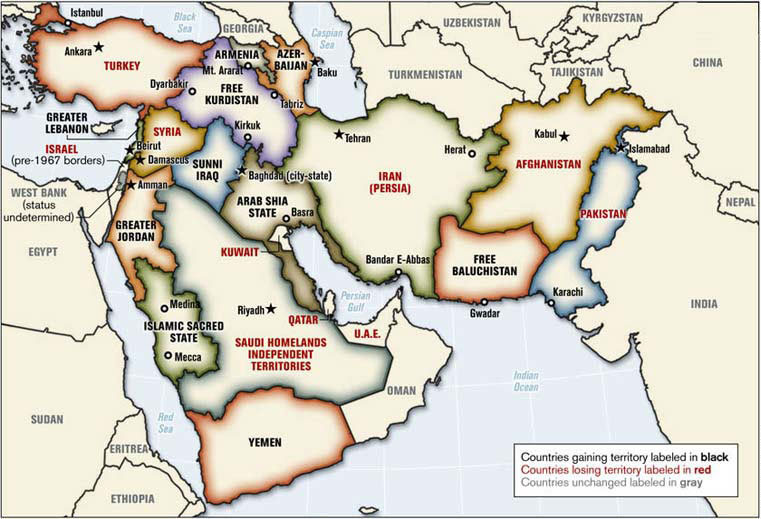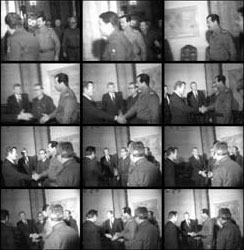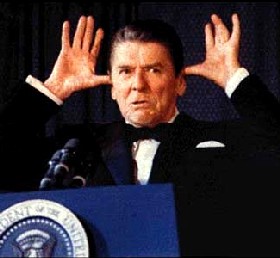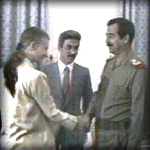|

by Michael Carmichael
Global Research, March 4, 2007
The Planetary Movement
from
PlanetaryMovement Website
The Taliban’s attempted assassination of
US Vice President Dick Cheney earlier this week in Afghanistan
highlighted a supreme irony. Immediately after hearing what he
described as a, “loud boom,” Cheney was swiftly whisked into a bomb
shelter in a replay of his movements on 9/11.

Two days before the suicide attack (allegedly by the Taliban) - that
claimed the lives of 23 people at the Bagram Air Base and targeted
Vice President Cheney - a scandal of monumental proportions had just
surfaced in America.
The New Yorker’s ace investigative reporter, Seymour Hersh, had done
it again with his latest earth-shattering exposé.
Hersh revealed
Dick Cheney and his henchmen had deliberately set about inciting
chain reactions of sectarian violence and civil wars across the
Middle East via a massive covert operation disguised as a shift of
geopolitical strategy.
It was therefore entirely appropriate
that the earth itself opened up in Bagram and came close to
swallowing up the main perpetrator of this seemingly unstoppable
nightmare - namely US Vice President Dick Cheney. Now, instead of
launching a war against Iran, Cheney with Bush’s complicity, have
pulled the trigger on a covert war of global proportions pitting
Sunnis against Shias.
According to Hersh, Cheney’s covert plan involves massive US
financial backing for militant Sunni groups that are known to be
inimical to the Shia militias of the Badr Brigades, the Mahdi Army,
Hamas and Hezbollah all of whom support the revolutionary government
of Iran. The US-backed Sunnis include
the Muslim Brotherhood, a vast
and powerful multinational organization, who are definitely on
friendly terms with Al-Qaeda and its allies, including the Taliban.
The government of Saudi Arabia is Sunni,
although they are deeply despised by the Muslim Brotherhood, the
Taliban and Al-Qaeda because of their subservience to their masters
in big oil and George Bush’s America.
The Israeli right and a rogue faction of the royal family of Saud
who are loyal to Prince Bandar bin Sultan are backing Cheney’s
covert plan. The ultimate objective of Cheney’s redirection of US
strategy in the region is to redraw the national boundaries of the
Middle East and to give an explosive multiple birth to a sprawling
litter of new cantons, colonies, domains, enclaves, protectorates, statelets and territories all pledged to American and Israeli
dominance of the region and its precious oil, gas and energy
reserves.
-
For starters, Lebanon is to be dismembered so as to form a chain of
new semi-autonomous and religiously segregated cantons: one Sunni,
one Christian, one Alawi and one Shia
-
Iraq will suffer the worst
and most disfiguring surgery
-
Baghdad will become a City State and
poised perilously on the border between the new Arabic Sunni and
Arabic Shia states
-
The southern borders of the Arabic Shia State
will straddle Kuwait and extend down south to include the oil-fields
of southern Iran on the east and an oil-rich strip of Saudi Arabia
on the west
-
A new state of Free Kurdistan will be
separated from the Sunni and Shia enclaves of Iraq
-
A Greater Jordan
will be carved out of Saudi Arabia to provide more space for the
relocation of Palestinians
-
A Free Baluchistan that will include
Helmand province and Kandahar will be severed from Afghanistan
-
Perhaps, most controversially, an Islamic Sacred State that will
include the holy cities of Mecca and Medina in the Hejaz will be
surgically separated from the rest of Saudi Arabia.

Coincidentally, at the same time that Cheney is fomenting religious
conflicts and civil wars between the Sunnis and the Shias, the
US-backed government in Iraq is poised to hand over control of Iraqi
oil production to the western oil companies. In this plan, the
government of Iraq will retain their ownership of the oil reserves,
but they are irrevocably awarding the right to extract the oil
reserves exclusively to big oil.
Given this sequence of events, Dick
Cheney might argue for the Jungian principle of synchronicity – an
unexplainable consequence of simultaneity sometimes as pleasant as
serendipity but sometimes as painful as catastrophe – but few would
believe him. Cheney might implore,
“Why not redistribute the oil
wealth of Iraq to big oil at the same time the US shifts its
strategy to trigger a wave of religious confrontations designed to
dismember, dissect and carve up the entire region while masking the
expropriation of the Iraqi people’s oil rights?”
The reply could be,
“Because this crude
tactic is blatantly immoral, unethical and illegal.”
But, those
trivialities have never stopped Cheney before, nor are they likely
to stop him now.
As America’s most celebrated investigative reporter, Seymour Hersh’s
list of explosive revelations has included:
-
the My Lai Massacre
-
provocative US intelligence
operations that triggered the Soviet attack on KAL Flight
007
-
Robert Maxwell’s complicity in
the arrest of Israeli whistleblower Mordechai Vanunu
-
a growing series of exposés
spinning out of the Iraq War and the planning for the Iran
War
While Hersh’s record of exposing major
scandals is firmly established, nothing that he has ever reported to
date approaches the enormity of his latest investigation. In his
paper titled simply,
The Redirection, Hersh reveals presidential
involvement in the massive covert operation to ignite a religious
war in the Middle East as a prelude to the forcible reconfiguration
of the region into a new patchwork quilt of pliable and supplicant
theocratic cantons designed to enshrine the security of Israel and
the over-arching supremacy of US oil interests.
For his part, Hersh urges Congress to perform its constitutional
duty to oversee the massive expenditures for the covert operations
that he traces to untold billions in raw currency in US dollars that
were conveniently stockpiled in Iraq where they were earmarked for
“reconstruction.” However, instead of rebuilding the cities and
infrastructure of Iraq, the mega-billions in US cash are now being
subverted to the bank accounts of radical Sunni groups known to be
in league with Al Qaeda and their patrons – the Taliban.
Hersh quotes well-known regional authorities who are confidently
predicting a US and Israel-backed confrontation between Shia and
Sunni forces. The covert American-Israeli plan to expand the Iraq
Civil War to engulf the entire region in a blazing arc of atrocities
and ultra-violence that will extend from Lebanon to Afghanistan is
the brainchild of the neoconservative cell remaining in power in the
Bush White House:
-
Vice President Dick Cheney
-
National Security Advisor Elliot
Abrams
-
Ambassador Zalmay Khalilzad
-
their co-conspirator from Saudi
Arabia, Prince Bandar bin-Sultan, the former Saudi
Ambassador to Washington who now finds himself at odds with
other factions of the royal family of Saud

As the undeniable head of the severely
weakened neoconservative rump left dangling after the sackings of
Donald Rumsfeld and John Bolton, it is no secret that Dick Cheney is
being isolated. Cheney’s political isolation has forced him to take
matters into his own hands, and he has shamelessly invaded the turf
of Secretary of State Condoleezza Rice in recent months.
Uncharacteristically, Cheney was flushed
out in December when he met with King Abdullah of Saudi Arabia,
apparently to forge the tentative alliance for the redirection of US
policy to channel massive covert funding to Sunni militants. Last
week, Cheney visited Pakistan ostensibly to castigate President Pervez Musharraf and to insist on more assertive direct action
against the Taliban.
After the bomb ripped through Bagram,
Cheney – who is usually optimistic and chipper - appeared to be
chastened, silent, even morose. Two days later, Musharraf announced
the arrest of a leading Taliban figure, and sectarian violence broke
out near the border between Pakistan and Iran. In the western media,
the press is filled with stories describing Cheney’s fall from grace
and his duel with Rice over the presidential power to dictate
foreign policy.
Another peculiar aspect of the case involves Dick Cheney’s elder
daughter, Elizabeth Cheney, the mother of five. The Vice President
arranged for Elizabeth Cheney to be appointed to the office of
Principal Deputy Assistant Secretary of State for Near Eastern
Affairs in the State Department. In her official capacity, Elizabeth
Cheney also headed a shadowy operation called the Iran-Syrian
Operations Group (ISOG) that was empowered to allocate funds
totaling circa $80 million per year to dissident groups in Iran.

(Elizabeth Cheney
paid $80 million per year to Iranian dissidents.)
In recent months, the Bush White House
has issued a series of complaints about Iran arming terrorists in
Iraq with explosive devices that have been traced to the Iranian
military. At this time, Congress does not know whether any of the
funding directed by Cheney’s elder daughter was subverted to arm
terrorists – or not. This weekend, armed conflict in the border area
between Iran, Pakistan and Afghanistan has been traced to Sunni
terrorists in Iran who are funded by America.
Coming as it does
promptly after Cheney’s visit to the region and his shake-up of
Pakistani intelligence officials, this troubling aspect of the
current policy redirection detailed by Hersh should surely become
the subject of Congressional scrutiny.
In the finale to his latest article,
Hersh implores Senator Jay Rockefeller and Senator Ron Wyden of the
Intelligence Committee to hold public hearings to probe, to expose
and to investigate as promptly and thoroughly as possible what
should now be termed: The Iran-Qaeda Scandal.
The 110th Congress promised great accomplishments. In their first
100 hours, they did pass some impressive legislation. However, due
to the political dynamics – and the weakened makeup of the Senate,
there is actually little room for the Democrats’ razor thin majority
to maneuver against a presidential veto. Impeachment, that requires
67 votes for conviction in the Senate, is – at this time – out of
the question. However, that situation could change if a new
strategic course were adopted – one that would challenge the
legality of Cheney’s covert redirection of US policy into a grand
scheme to ignite a religious war of global proportions.
It is crystal clear, thanks to Hersh, that Congress should launch an
investigation next week into Cheney’s costly and dangerous covert
war. It would be surprising if in the course of this investigation
that the Senate did not discover incriminating evidence against the
Vice President linking him to the:
-
abuses of presidential power
-
obstruction of justice
-
misappropriation of federal
funds
-
violations of US and
international law against the incitement of war, conflict
and acts of terrorism
Already more unpopular than his deeply
unpopular president, Cheney should actually be the strongest,
fittest and most worthy candidate for impeachment in the crosshairs
of the Senate snipers. Dr Steven Jonas has been advocating that
Congress ought to target Cheney for impeachment rather than Bush –
and Hersh has now provided the ammunition for what appears to be an
airtight case for high crimes and misdemeanours against the
risk-loving Vice President. Now that he is seen to be a far greater
political liability to the Republican administration, members of his
own party will begin to move against Cheney.
If Cheney were to be impeached and removed from his office, the way
would be cleared for Bush to nominate his successor. This tactic
would give the fibrillating Republican ticket a much-needed syringe
of adrenaline. At this point, Cheney is without any shadow of doubt
the biggest liability for any potential Republican presidential
nominee. Bush is seen as a broken alcoholic bungler
who thinks he
talks to god, while Cheney is now seen as an increasingly dangerous
and violence-prone lunatic. If Cheney were to go, Bush would be able
to shift the focus of criticism away from himself as well as turn
his vast political powers to the selection of his nominee for the
grandest appointment any president can make: a Vice-President worthy
of succeeding him.
The current Republican presidential hopefuls present a rich field
for Bush to consider as Cheney’s replacement. John McCain would
instantly become the lightning rod for all criticism of Bush’s
handling of the war. Rudolf Giuliani would vividly recall the
defining moment of the Bush presidency – 9/11 when Bush’s popularity
topped ninety per cent. Mitt Romney would invigorate the grassroots
and the evangelicals while providing a fresh face and a relatively
clean slate – the closest thing to a new beginning Bush is likely to
get.
Condoleezza Rice could be a much-needed
form of political insurance against both of the leading Democratic
contenders: Barack Obama and Hillary Clinton. The impeachment of
Dick Cheney for wrecking US foreign policy with his covert war
pitting the Sunnis against the Shias could be seen as the potential
salvation of the Republican Party, an organization that increasingly
sees itself as inescapably doomed to decades of dark and divisive
political oblivion.

(Rudolf Giuliani
currently leads the Republican field for the presidential
nomination.)
The Senate investigation of Iran-Qaeda
should, once again, subpoena the documents of the Vice President’s
secret briefings on energy policy that have been classified since
early 2001. Continued reticence to cooperate with a Senatorial
investigation into the legality of covert operations to precipitate
a global religious war between the Sunnis and the Shias – with the
Bush-Cheney White House arming, backing and financing the Sunnis -
would be untenable in today’s political climate.
If the White House were to be uncooperative and refused to respond
to a subpoena for the background documents, the Senate should
subpoena the Vice President, Ambassador Khalilzad, Prince Bandar bin
Sultan and Elliot Abrams. Then, these witnesses should be invited to
testify in public about their covert operations to launch a massive
bloodbath to protect the financial interests of the big oil
companies.
That’s the American way.

(Ambassador Zalmay
Khalilzad surrounded by security personnel.)
While there is actually a myriad of
potentially incriminating investigations into Bush Era shenanigans,
none offer the rich target field presented by the Iran-Qaeda
scandal. The back-story is riveting.
The United States has a very chequered post-war history with Iran.
In 1953, the CIA orchestrated a coup to overthrow the democratically
elected government of Mohammed Mossadegh after he announced his plan
to nationalize the oil reserves of Iran.
The US supported the predatory autocracy of Shah Reza Pahlavi, and
the CIA trained his infamous intelligence organization, the Savak.
The cruelty and excess of the Shah’s reign paved the way for the
Iranian Revolution in the 1970s. Revolutionaries held 53 American
bureaucrats hostage for more than one year, a crisis that triggered
the downfall of the progressive presidency of Jimmy Carter.
Covert meetings designed to undermine Carter’s campaign for
re-election between former CIA agents supporting the Reagan-Bush
ticket and their Iranian counterparts only became public knowledge
in the aftermath of the Reagan presidency. The elder brother of
George H. W. Bush, Prescott Bush supervised these covert
negotiations that led to the retention of the US hostages to cripple
Carter’s campaign in 1980.
The senior Bush was aided by William Casey, who became one of the
most controversial Directors of Central Intelligence in American
history through his involvement in the Iran-Contra Scandal that
occurred during the second term of the Reagan-Bush government. Some
see the October Surprise as the act of conception of the Iran-Contra
scandal.
This treasonous scandal has never received a balanced investigation
by Congress, but the incriminating facts were made known by a
fearless American academic, Gary Sick, who detailed the conspiracy
in his authoritative book,
The October Surprise. Swiftly attacked by
Daniel Pipes, Bush-loyalist and neocon ideologue extraordinaire,
Sick became the target of the usual suspects who arranged a
Congressional whitewash during the reign of Bush the First to
prepare the groundwork for his re-election in 1992. But, the American
people did not buy it.
In 1992, Bill Clinton defeated Bush who
had become an object of derision for his political abuse of the
military and intelligence communities and his unpopular economic and
foreign policies. The case of former intelligence officials actively
collaborating with agents of a foreign power inimical to America to
rig a US presidential election is a lingering disgrace that
prefigured the continuous confrontation between the US and Iran that
continues to the present day.

(Daniel Pipes blames
the failure of the US war in Iraq on the ingratitude of the Iraqi
people.)
During the Hostage Crisis, the US urged
Saddam Hussein to attack Iran to bring about regime change in
Tehran. Boasting that he would be in Tehran in days, Saddam led the
west’s proxy war against the Iranian Revolution. The war did not go
as Saddam and his backers had hoped. The conflict stagnated into a
war of attrition.
The US policy of ostensibly favoring Saddam led
to the infamous handshake between Donald Rumsfeld and Saddam
Hussein, as well as the arming of the Iraqi Republican Guard with
sophisticated weaponry including high grades of weaponized Anthrax.


 see
"Briefing
Notes for Rumsfeld Visit to Baghdad," 3/24/84 see
"Briefing
Notes for Rumsfeld Visit to Baghdad," 3/24/84
In the course of the war, President Reagan and members of his
government ordered Colonel Oliver North to supervise a covert plan
to arm Iran – fulfilling the pledge made during the October Surprise
negotiations.
The plan was insidious for the Iran-Contra
conspirators arranged to funnel the money raised by the sale of arms
to Tehran to fund the Contras, a thinly disguised cadre of death
squads running amok in Nicaragua and other parts of Central America.

(Ronald Reagan said,
“Facts are stupid things.”)
One year after the bitter Iran-Iraq War
drew to its close in 1988, Saddam asked the US for permission to
annex Kuwait.
Bush the First was president, and his ambassador to
Baghdad, April Glaspie, met with Saddam and deliberately failed to
deny his request for permission to invade Kuwait. James A. Baker was
Bush’s Secretary of State at the time, and Ambassador Glaspie
specifically cited him as the source for the American position of
neutrality vis a vis Saddam’s annexation of Kuwait.
Here is a verbatim transcript of April Glaspie’s official granting
Saddam permission to invade Kuwait:
“We have no opinion on your Arab -
Arab conflicts, such as your dispute with Kuwait. Secretary (of
State James) Baker has directed me to emphasize the instruction,
first given to Iraq in the 1960’s, that the Kuwait issue is not
associated with America.”

(Ambassador
Glaspie shakes hands with Saddam Hussein.)
Upon hearing this statement,
Saddam
Hussein smiled, and the meeting was closed as the fate of Kuwait was
sealed.
After Iraq’s invasion of Kuwait, Bush, Sr. and Baker felt the sting
of political backlash and swiftly reversed their position. The
Persian Gulf War ensued, and Saddam was put back into his box and
kept there until the invasion of Iraq in March 2003.
The events leading up to the confrontation between the Bush-Cheney
White House and Iran have been revealed in Hersh’s three papers: The
Next Wars; The Iran Plans and The Redirection. Taken collectively,
these publications now expose the deeply unpopular Vice President to
impeachment in the US Congress.
The Iran-Qaeda crisis is a far more serious threat to the national
security of the United States than the Watergate break-in.
Iran-Qaeda is much more sinister than the Iran-Contra conspiracy.
Iran-Qaeda is far more foolish than either of those historic
scandals by an extremely wide margin.
Scandals in American history define their eras. The excessive
bribery and corruption of Tea Pot Dome heralded the Wall Street
Crash and the end of laissez faire capitalism. The Watergate crisis
signaled the need for closer Congressional scrutiny of the
operations of the White House and the dangerous accumulation of
extraordinary powers in the presidency. The Iran-Contra Scandal
illustrated the prescience of
Eisenhower’s prophecy of caution, to
beware the influence, whether sought or unsought, of the military
industrial complex.
The emerging Iran-Qaeda scandal
encompasses the lessons of all three major American twentieth
century scandals:
-
unprecedented levels of official
corruption
-
dangerous levels of
unilateralist and covert presidential power
-
the excessive abuses of power by
the military-industrial lobby and their useful idiots in the
Bush-Cheney White House and their reliable allies in pliant
nations from Israel to Saudi Arabia
The world is already outraged at the
war-torn Bush-Cheney presidency, but when the facts of Cheney’s
reckless and piratical hijacking of foreign policy become generally
available to the mainstream the domestic reaction against the latest
American scandal will be absolutely volcanic.
America’s first president, George Washington, cautioned the young
nation against becoming involved in foreign entanglements.
“Why quit our own to stand upon
foreign ground? Why, by interweaving our destiny with that of
any part of Europe, entangle our peace and prosperity in the
toils of European ambition, rivalship, interest, humor, or
caprice?”
While America did become involved in two
world wars, but both were raging before America became engaged.
Cheney’s redirection of America’s strategy contradicts Washington’s
dictum by inciting foreign wars and campaigns of terror against
America and its allies - a flagrant violation of America’s original
military and diplomatic traditions.
Thomas Jefferson stated,
“We see the wisdom of Solon’s remark, that
no more good must be attempted than the nation can bear.”
Cheney’s
reckless escalation of covert operations in the Middle East is proof
that he is the antithesis of Solon and Jefferson.
One of America’s greatest presidents, John Quincy Adams, warned that
America must not seek out monsters to destroy lest she would become
“dictatress of the world.”
The spirits of departed American presidents are hovering over the
monuments and buildings of Washington gathering for a perfect storm
of constitutional ultra-violence and the ensuing battle for the
hearts and minds of America over the nemesis of Iran-Qaeda.

Quotations
from Seymour Hersh’s, The Redirection
“The key players behind the
redirection are Vice-President Dick Cheney, the deputy
national-security adviser Elliott Abrams, the departing
Ambassador to Iraq (and nominee for United Nations Ambassador),
Zalmay Khalilzad, and Prince Bandar bin Sultan, the Saudi
national-security adviser. While Rice has been deeply involved
in shaping the public policy, former and current officials said
that the clandestine side has been guided by Cheney.”
“(Walid) Jumblatt then told me that he had met with
Vice-President Cheney in Washington last fall to discuss, among
other issues, the possibility of undermining Assad. He and his
colleagues advised Cheney that, if the United States does try to
move against Syria, members of the Syrian
Muslim Brotherhood
would be ‘the ones to talk to,’ Jumblatt said.”
“Jumblatt said, ‘We told Cheney that the basic link between Iran
and Lebanon is Syria—and to weaken Iran you need to open the
door to effective Syrian opposition.’”
“Jumblatt said he understood that the issue was a sensitive one
for the White House. ‘I told Cheney that some people in the Arab
world, mainly the Egyptians’ —whose moderate Sunni leadership
has been fighting the Egyptian Muslim Brotherhood for
decades—‘won’t like it if the United States helps the
Brotherhood. But if you don’t take on Syria we will be face to
face in Lebanon with Hezbollah in a long fight, and one we might
not win.’”

(Seymour Hersh)
References
|














